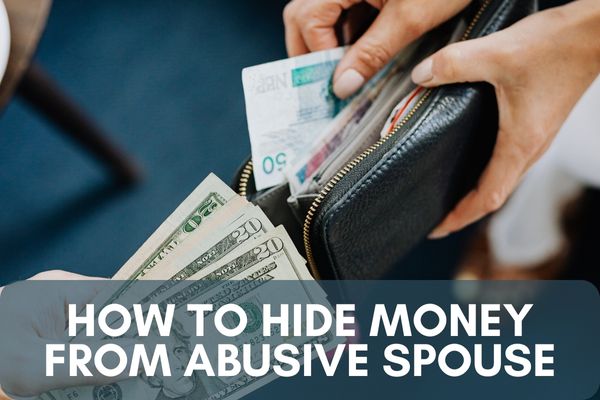You are right to be concerned about your money when with an abusive partner, and the question “How to hide money from abusive spouse’ is not unnecessary.
You’ve finally decided to separate from your violent partner. You know the time has come, but you are afraid of what your spouse could say or do if they learn that you intend to leave. You have savings, but you are concerned about how to protect them.
We recognize that ending an abusive relationship can be challenging, mainly if you are concerned about your safety and financial stability. In this post, we’ll give you some advice on how to keep your money secure throughout and after your transition and hide it from a controlling spouse.
What would you do if you were in an abusive relationship and your partner began inquiring about your financial situation? It isn’t easy to imagine. What if they questioned the whereabouts of your whole financial estate?
It’s critical to have a strategy to safeguard your finances. Here are some pointers to get you going;
How to hide money from abusive spouse
- Begin establishing a covert savings account. If your partner asks too many questions about your finances, this is an excellent way to keep your money secure. Make sure the bank is distinct from the one you use with your partner, and keep the bank’s name and account information secret.
- Keep some cash in a hidden place at home. This is a fantastic fallback strategy if you must depart immediately. Keep the money hidden from your partner in a secure location.
- Make an escape plan. Do you have a buddy or relative you can turn to in a pinch? Make sure you have a safe place to keep their contact information accessible,
Hide your money in a discreet location to keep it secure. It may be challenging to accomplish this if your partner is constantly around, but it is feasible. Money could be stored in a shoe, a safe, a drawer, or under your mattress. Generally speaking, someplace your spouse would not think to look.
- Asking a friend or family member to hold onto your money is another option to keep it secure. This will prevent your spouse from accessing the money even if they locate it.
- You might even open a covert bank account and transfer the funds there. Your spouse won’t even be aware that money is there this way.
Make sure you have a strategy and are ready for whatever you decide. In an abusive relationship, having extra cash can save your life.
How do you hide money from a controlling spouse?
Understanding your finances and the options you have is the first step. You ought to be completely aware of your monthly income and expenses, enabling you to calculate how much you can save covertly.
A domineering spouse might be physically avoided in several ways. Keeping cash stashed in a secure location inside your home is one possibility. Another choice is to open a separate bank account that your spouse is unaware of and make regular deposits. You can even maintain your savings under the name of a friend or member of your family if you are concerned about your spouse discovering concealed money.
If you are concerned that your spouse is keeping tabs on your expenditures, use cash whenever possible instead of credit or debit cards. Additionally, you might create a budget to ensure you do not spend more than you can comfortably afford. Having a strategy in place for what you’ll do if your spouse discovers your hidden finances is crucial.
When it comes to money, several distinct sorts of abuse can occur.
One instance is when your spouse refuses to give you money. They might do this to exert control over you or to make you feel reliant on them. Another is when your partner makes impulsive purchases that you can’t afford. You could feel helpless and overwhelmed as a result.
The use of money by your spouse to control and manipulate you constitutes a third form of abuse. They may give you an allowance and monitor your spending, or they may ignore your debt by not paying debts. Any of these actions constitute abuse and must be corrected.

What is hidden abuse?
Financial abuse, known as “hidden abuse,” relies on deception and control rather than direct physical harm to the victim to maintain the relationship. Because it’s frequently not as visible as other forms of abuse, it can be challenging to spot.
Common indications of unreported abuse include:
– Abrupt adjustments to spending or credit card usage
– Unforeseen fees or withdrawals from accounts
– Being prohibited from obtaining financial records
– A sudden drop in your credit score
– Being informed that you cannot work
It’s crucial to seek assistance if you notice any of these symptoms. Financial abuse victims have access to a wealth of resources, so they don’t have to suffer alone.
Financial abuse is when one partner exerts control over the other partner’s ability to access financial resources, reducing the abused partner’s ability to be financially independent and forcing them to rely on the abuser financially.
In a toxic marriage, one partner may try to take control by seizing the majority of the assets. The abusive partner’s overarching goal is obvious: prevent the spouse from obtaining the means to end the relationship.
Financial abuse, also known as economic abuse, is when one spouse makes it such that the other spouse cannot access liquid assets.
A marriage with financial abuse has a highly unhealthy dynamic.
Every spending is meticulously tracked. Grocery store purchases and other transactions are closely monitored, and the “buyer” is only handed the money necessary to complete the transaction.
It’s advised against spending money on clothing, health care, and other expenses. There is a “price” to pay if a partner disobeys these strict demands.
Before we discuss spousal financial abuse and examine the dynamics of a financially abusive relationship, let’s be clear.
Financial abuse in marriage can be equally as destructive as physical abuse and is a subset of emotional abuse.
There is cause for alarm whenever the demand for complete financial control drives our intimate partners’ activities in a marriage.
Financial abuse by a spouse can have significant repercussions for the marriage and is a quiet weapon in relationships.
You can find ways to avoid falling into the trap of financial abuse in marriage by keeping track of the early warning signs of it.
How can You Tell who the Abuser is?
It can be challenging to determine who is abusing who in a relationship. There are many indicators to watch for, but it frequently requires a skilled expert to identify the abuser truly. The following are some warning indicators that a person may be an abuser:
They attempt to regulate everything you do.
– They exhibit extreme possessiveness and jealousy.
– They make an effort to keep you apart from your loved ones.
– They continually criticize you, both in public and private.
– They hold you responsible for all of the relationship’s problems.
– They’ve threatened or used violence in the past.
– They have a track record of using abusive or controlling tactics in previous relationships.

How do you Manage an Abuser?
You might be thinking about how you would deal with an abuser. You must first realize that an abuser won’t suddenly change, and the abuse will continue even if they sincerely mean it when they apologize.
What can you then do? The most crucial thing is maintaining your physical and emotional safety, which entails putting together a safety plan and preparing to evacuate if required.
Additionally, it would be best if you created a network of trustworthy friends and family members. Make sure they are aware of your situation. These people can offer a shoulder to cry on, a listening ear, and a secure place to stay if required.
Finally, remember that you are not by yourself. The National Domestic Violence Hotline is one example of an organization that can assist. You can also find helpful resources on the National Coalition Against Domestic Violence website.
You may take measures to protect your money if you’re in an abusive relationship and concerned about your finances. Start by attempting to keep some cash in a secure location, such as a hidden room in your house or a P.O. box.
Consider creating a new account at a different bank and transferring funds whenever you can if your spouse has access to your bank accounts. Keeping track of all your spending will help you understand where your money is going.
Lastly, if you own any investments or assets, keep a copy of all the supporting documents in a secure location so you can access them when necessary.
Finally, anyone can likely suffer from financial abuse in an abusive relationship. When one partner tries to control the other partner’s finances, it is referred to as financial abuse.
You can take the following actions to protect your money:
– First, open a secret bank account independent of your relationship. You’ll have somewhere to go if you need to get away from your lover in this way.
– Obtain a credit card under your name next. This can be useful if you need to buy purchases secretly from your partner.
– Start setting aside money, which will give you a safety net if you need to break up with your partner.
Recognize that you are not alone. If you are in an abusive relationship, options are available.








